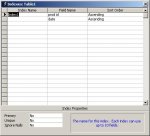i am running a query to produce top 2 dates in each "prop id" category (see SQL below).
the progress bar hasn't moved even a fraction of a millimeter while i was out to lunch.
is it normal? how slow can it go?!
the dbase is only about 47000 records strong.
l
SELECT S.[prop id], S.date
FROM dbase1 S
WHERE (((S.[year])>=2006) AND ((S.date) IN (SELECT
TOP 2 T.date from [dbase1] T WHERE T.[prop id] =
S.[prop id] Order by T.date DESC)))
ORDER BY S.[prop id], S.date DESC;
the progress bar hasn't moved even a fraction of a millimeter while i was out to lunch.
is it normal? how slow can it go?!
the dbase is only about 47000 records strong.
l
SELECT S.[prop id], S.date
FROM dbase1 S
WHERE (((S.[year])>=2006) AND ((S.date) IN (SELECT
TOP 2 T.date from [dbase1] T WHERE T.[prop id] =
S.[prop id] Order by T.date DESC)))
ORDER BY S.[prop id], S.date DESC;

